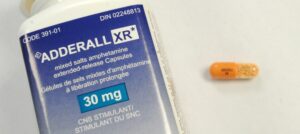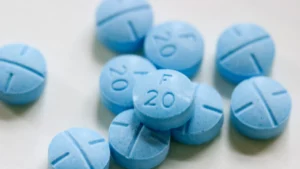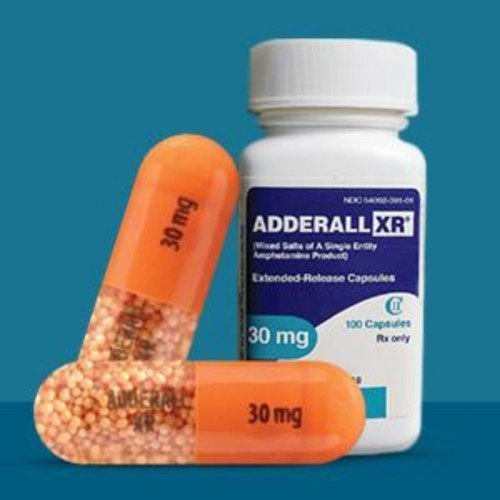If you’re like most people, you’ve probably heard of Adderall but don’t know much about it. Amphetamines are a type of drug that is used to treat attention-deficit hyperactivity disorder (ADHD) and narcolepsy. Adderall is a prescription medication that contains amphetamine and dextroamphetamine. It is a stimulant that helps increase focus and concentration. In this blog post, we will discuss the effects of amphetamines, the risks associated with taking them, and how to get help if you need it.
Contents
What Is Adderall?

Adderall is a medication that contains amphetamine and dextroamphetamine. It is used to treat attention-deficit hyperactivity disorder (ADHD)
Adderall is a central nervous system stimulant. It is made up of two different types of amphetamines, dextroamphetamine, and levoamphetamine. These work together to increase focus and concentration. Adderall is used to treat narcolepsy and attention-deficit hyperactivity disorder (ADHD).
Amphetamines are stimulants that increase the activity of the nervous system. They are also known as “uppers” because they make people feel more alert and energetic. Dextroamphetamine is the active ingredient in Adderall. It increases the levels of dopamine and norepinephrine in the brain. These chemicals are also involved in regulating mood, motivation, and focus.
How Does Adderall Work?
Adderall works by increasing the levels of dopamine and norepinephrine in the brain. These chemicals involve regulating mood, motivation, and focus. The exact way that Adderall works is not fully understood, but it is thought to work by affecting the parts of the brain that control impulses and attention.
Adderall works by increasing the levels of dopamine and norepinephrine in the brain. These are neurotransmitters that help with focus and concentration. The increased levels of these chemicals make it easier for people with ADHD to focus on tasks and pay attention. It works by changing the amounts of certain natural substances in the brain.
Intake
It comes in 2 prominent forms:
- Adderall oral tablet, which is an immediate-release (IR)* form of the drug.
- Adderall XR oral capsule, which is an extended-release (ER)* form of the drug.
The immediate-release tablet is to be taken 2-3 times daily at a 4-6 hour gap, with or without food.
The extended-release tablet is to be consumed upon awakening and should be avoided in the evening/late night as it may cause difficulty in falling asleep.
The capsules are to be consumed as wholes; do not crush or chew them.
If unable to consume in one go, crush the contents of the capsule over a spoon of applesauce. Swallow this mix as a whole without chewing. However, pre-mixing and batching the applesauce and medication mixture beforehand is not a good recommendation.
Dosage

Adderall is available in tablet and extended-release capsule form. The tablets are available in three different strengths:
- IR: immediate-release, which starts working right away
- XR: extended-release, which lasts for up to 12 hours
- Mydayis: extended-release, which lasts for up to 16 hours
Adderall dosage for both children and adults starts at a lower dose, usually 2.5 mg once daily for children and 5 mg once or twice daily for adults.
Benefits
Amphetamines are a type of drug that mainly treats
- ADHD (Attention-Deficit Hyperactivity Disorder)
- Narcolepsy (chronic sleep disorder, categorized by extreme daytime drowsiness and sudden attacks of sleep)
Adderall is a prescription medication that contains amphetamine and dextroamphetamine. These work together to increase focus and concentration. Adderall also works by increasing the levels of dopamine and norepinephrine in the brain. These are neurotransmitters that help with focus and concentration. The increased levels of these chemicals further make it easier for people with ADHD to focus on tasks and pay attention.
For improving narcolepsy, Adderall boosts the levels of a brain chemical called norepinephrine, which further helps to promote wakefulness.
Side Effects

Just like any other psychiatric medication, Adderall also has a few common side effects. These may include consequences such as
- nervousness
- headaches
- dry mouth
- slowed speech
- fluctuations in libido
- vision changes
- increased heartbeat
- swelling/numbness in limbs
- stomach problems like constipation, diarrhea, vomiting, loss of appetite
- skin blisters
Some serious side effects may also include problems such as:
- seizures
- hallucinations
- paranoia
- other mental health conditions like depression, anxiety, or psychosis
- insomnia
- Tourette’s syndrome
- suicidal thoughts
Severe and unmonitored side effects can also lead to life-threatening consequences such as
- heart attack
- swelling of tongue/face
- worsening of co-existing illnesses/diseases
Alternatives
In case of hypersensitivity to reactions, one can consider seeking alternatives to this medication with your doctor’s recommendation. These include other medicines such as:
- Stimulant medications such as methylphenidate (Ritalin) and lisdexamfetamine (Vyvanse)
- Non-stimulant medications such as atomoxetine (Strattera), guanfacine (Intuniv), and clonidine (Kapvay)
- Antidepressants such as bupropion (Wellbutrin) or tricyclic antidepressants
- Behavioral therapy
- Adjunctive treatments such as omega-three fatty acids, meditation, and neurofeedback training.
General Warnings
Although your doctor will inform you about the precautionary measures in the context of your medical background, symptoms, and reaction to the medication, it is important to know some general warnings before considering this medication for treatment.
- Pregnant women should only take the medication when necessary. Additionally, breastfeeding women should avoid it altogether.
- Children (below 3) and older adults (above 65) can be hypersensitive to the side effects; hence, they should have close and regular monitoring.
- Limiting the consumption of alcohol and/or marijuana is essential to avoid a cross-reaction.
- Inform your doctor about your history of heart-related problems such as cardiac arrest, high blood pressure, irregular heartbeat, and hardening of veins/arteries, among other things.
- Do not drive, use machinery, or do any activity that requires alertness, since the medication might impair your reactions.
- Tell your doctor and pharmacist if you are allergic to amphetamine, dextroamphetamine, other stimulant medications such as benzphetamine, lisdexamfetamine (Vyvanse), or methamphetamine (Desoxyn)
Conclusion
Amphetamines are a type of drug that mainly treats Attention-Deficit Hyperactivity Disorder (ADHD) and Narcolepsy. Adderall is a prescription medication that contains amphetamine and dextroamphetamine. These work together to further increase focus and concentration. Adderall also works by increasing the levels of dopamine and norepinephrine in the brain. These are neurotransmitters that moreover help with focus and concentration. The increased levels of these chemicals make it easier for people with ADHD to focus on tasks and further pay attention. It is important to talk thoroughly with your doctor about an official prescription, and medical history, and further effectively manage side effects for the best results.
A Word From Therapy Mantra
Your mental health — Your psychological, emotional, and social well-being — has an impact on every aspect of your life. Positive mental health essentially allows you to effectively deal with life’s everyday challenges.
At TherapyMantra, we have a team of therapists who provide affordable online therapy to assist you with issues such as depression, anxiety, stress, workplace Issues, addiction, relationship, OCD, LGBTQ, and PTSD. You can book a free therapy or download our free Android or iOS app.


